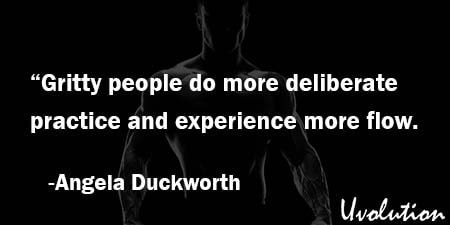Grit by Angela Duckworth
The Book in 1 Sentences
Grit: The Power of Passion and Perseverance
“To be gritty is to keep putting one foot in front of the other. To be gritty is to hold fast to an interesting and purposeful goal. To be gritty is to invest, day after week after year, in challenging practice. To be gritty is to fall down seven times, and rise eight.” ~ Angela Duckworth
5 BIG Ideas
1. It was this combination of passion and perseverance that made high achievers special.
2. Talent x Effort = Skill. Skill x Effort = Achievement
3. The 4 psychological assets to grow GRIT = Interest + Practice + Purpose + Hope.
4. Passion of gritty people is less like fireworks that come intensely and then fade away and more like a compass that guides every moment of their entire lives.
5. Children of psychologically wise parents fare better than children raised in any other kind of household.
Grit Book Summary
“Why were the highly accomplished so dogged in their pursuits? For most, there was no realistic expectation of ever catching up to their ambitions. In their own eyes, they were never good enough.
They were the opposite of complacent. And yet, in a very real sense, they were satisfied with being unsatisfied. Each was chasing something of unparalleled interest and importance, and it was the chase—as much as the capture—that was gratifying.
Even if some of the things they had to do were boring, or frustrating, or even painful, they wouldn’t dream of giving up. Their passion was enduring.
In sum, no matter the domain, the highly successful had a kind of ferocious determination that played out in two ways. First, these exemplars were unusually resilient and hardworking. Second, they knew in a very, very deep way what it was they wanted.
They not only had determination, they had direction. It was this combination of passion and perseverance that made high achievers special. In a word, they had grit.”
1. Passion + Perseverance = Grit
“By the last day of Beast, seventy-one cadets had dropped out. Grit turned out to be an astoundingly reliable predictor of who made it through and who did not.
The next year, I returned to West Point to run the same study. This time, sixty-two cadets dropped out of Beast, and again grit predicted who would stay.
In contrast, stayers and leavers had indistinguishable Whole Candidate Scores. I looked a little closer at the individual components that make up the score. Again, no difference.
So, what matters for making it through Beast?
Not your SAT scores, not your high school rank, not your leadership experience, not your athletic ability. Not your Whole Candidate Score. What matters is grit.”
Angela’s research on the power of grit begins at West Point where new cadets are put through a TOUGH super challenging initiation designed to help them “make the transition from new cadet to Soldier” called Beast Barracks (Beast) that last for two months.
And of course, there is a ton drop out during those 7 weeks.
The question is, can we predict who would drop out?!
Military scientists had been trying to figure out that but they couldn’t.
Angela says: “Not your SAT scores, not your high school rank, not your leadership experience, not your athletic ability.
Not your Whole Candidate Score.
What matters is grit.”
She made a very simple test to measure “GRIT” … She says: “Half of the questions were about perseverance. They asked how much you agree with statements like ‘I have overcome setbacks to conquer an important challenge’ and ‘I finish whatever I begin.’
The other half of the questions were about passion. They asked whether your ‘interests change from year to year’ and the extent to which you ‘have been obsessed with a certain idea or project for a short time but later lost interest.’”
Passion + Perseverance = Grit.
“There’s an old Japanese saying: ‘Fall seven, rise eight.’ If I were ever to get a tattoo, I’d get these four simple words indelibly inked.”
“The bottom line on culture and grit is: If you want to be grittier, find a gritty culture and join it. If you’re a leader, and you want the people in your organization to be grittier, create a gritty culture.”
Let’s learn how we can grow our grit…
2. Effort X 2
“I have been working on a theory of the psychology of achievement since Marty scolded me for not having one. I have pages and pages of diagrams, filling more than a dozen lab notebooks. After more than a decade of thinking about it, sometimes alone, and sometimes in partnership with close colleagues, I finally published an article in which I lay down two simple equations that explain how you get from talent to achievement.
Here they are:
talent x effort = skill
——————> skill x effort = achievement
Talent is how quickly your skills improve when you invest effort.
Achievement is what happens when you take your acquired skills and use them. Of course, your opportunities—for example, having a great teacher—matter tremendously, too, and maybe more than anything about the individual.
My theory doesn’t address these outside forces, nor does it include luck. It’s about the psychology of achievement, but because psychology isn’t all that matters, it’s incomplete.
Still, I think it’s useful. What this theory says is that when you consider individuals in identical circumstances, what each achieves depends on just two things, talent and effort.
Talent—how fast we can improve a skill—absolutely matters. But effort factors into the calculations twice, not once. Effort builds skill. At the very same time, effort makes skill productive.”
Angela also quotes Will Smith a few times in this chapter. He says: “I’ve never really viewed myself as particularly talented... Where I excel is ridiculous, sickening work ethic.”
And: “The only thing that I see that is distinctly different about me is: I’m not afraid to die on a treadmill. I will not be outworked, period. You might have more talent than me, you might be smarter than me, you might be sexier than me. You might be all of those things. You got it on me in nine categories. But if we get on the treadmill together, there’s two things: You’re getting off first, or I’m going to die. It’s really that simple.”
And remember that “Without effort, your talent is nothing more than your unmet potential. Without effort, your skill is nothing more than what you could have done but didn’t. With effort, talent becomes skill and, at the very same time, effort makes skill productive.”
3. Passion of Gritty People
“What I mean by a passion is not just that you have something you care about. What I mean is that you care about the same ultimate goal in an abiding, loyal, steady way.
You are not capricious. Each day, you wake up thinking of the questions you fell asleep thinking about. You are, in a sense, pointing in the same direction, ever eager to take even the smallest step forward than to take a step to the side, toward some other destination.
At the extreme, one might call your focus obsessive. Most of your actions derive their significance from their allegiance to your ultimate concern, your life philosophy. You have your priorities in order.”
Angela says that the passion of gritty people is less like fireworks that come intensely and then fade away and more like a compass that guides every moment of their entire lives.
It’s all about ONE THING - a top level goal that drives all the other goals.
And keep in mind that “Eventually, if you keep practicing in the same time and place, what once took conscious thought to initiate becomes automatic. ‘There is no more miserable human being,’ observed William James, than the one for whom ‘every beginning of every bit of work’ must be decided anew each day.”
4. How to Grow Our Grit
“In fact, when people drop out of things, they do so for a reason. Actually, they do so for different reasons. Any of the following four thoughts might go through your head right before you quit what you’re doing:
‘I’m bored.’
‘The effort isn’t worth it.’
‘This isn’t important to me.’
‘I can’t do this, so I might as well give up.’
There’s nothing wrong—morally or otherwise—with thoughts like these. As I tried to show in this chapter, paragons of grit quit goals, too. But the higher the level of the goal in question, the more stubborn they are about seeing it through.
Most important, paragons of grit don’t swap compasses: when it comes to the one, singularly important aim that guides almost everything else they do, the very gritty tend not to utter the statements above. ...
Together, the research reveals the psychological assets that mature paragons of grit have in common. There are four. They counter each of the buzz-killers listed above, and they tend to develop, over the years, in a particular order.”
Angela tells us there are four psychological assets we can cultivate to grow our grit… Interest + Practice + Purpose + Hope.
Interest: Gritty people must have interest and passion. They need to enjoy what they do and be committed to their passions. To dedicate time to their interests every single day, have an “enduring fascination and childlike curiosity” and “practically shout, ‘I love what I do!’”
Practice: Gritty people will dedicate themselves to practicing every day, and always striving to be better than the day before.
Purpose: The driver behind passion is having a purpose. Gritty people must understand their purpose and believe that their work matters in the world.
Hope: To believe that we have the ability to achieve what we set out to do. Hope makes us keep moving.
So again… The 4 psychological assets to grow GRIT = Interest + Practice + Purpose + Hope.
Angela also says: “Interest is one source of passion. Purpose—the intention to contribute to the well-being of others—is another. The mature passions of gritty people depend on both.”
5. Wise Parenting
“Indeed, over the past forty years, study after carefully designed study has found that the children of psychologically wise parents fare better than children raised in any other kind of household.
In one of Larry’s studies, for example, about ten thousand American teenagers completed questionnaires about their parents’ behavior.
Regardless of gender, ethnicity, social class, or parents’ marital status, teens with warm, respectful, and demanding parents earned higher grades in school, were more self-reliant, suffered from less anxiety and depression, and were less likely to engage in delinquent behavior.”
“Author and activist James Baldwin once put it this way: ‘Children have never been very good at listening to their elders, but they have never failed to imitate them.”
6. Grit and Genius
“‘You’re no genius,’ my dad used to say when I was just a little girl. I realize now that he was talking to himself as much as he was talking to me.
If you define genius as being able to accomplish great things in life without effort, then he was right: I’m no genius, and neither is he.
But if, instead, you define genius as working toward excellence, ceaselessly, with every element of your being—then, in fact, my dad is a genius, and so am I, and... if you’re willing, so are you.”
And always remember that “To be gritty is to keep putting one foot in front of the other. To be gritty is to hold fast to an interesting and purposeful goal. To be gritty is to invest, day after week after year, in challenging practice. To be gritty is to fall down seven times, and rise eight.”
That was my QUICK Grit Book Summary. If you’re interested, get your copy. There is a HUGE amount of wisdom and life-changing ideas in this book, and we’ve only touched on a tiny bit of it.
Buy The Book: Grit by Angela Duckworth

GET Blinkist 7 Days FREE Trial
3000+ Book Summaries
(Audio and Text)





